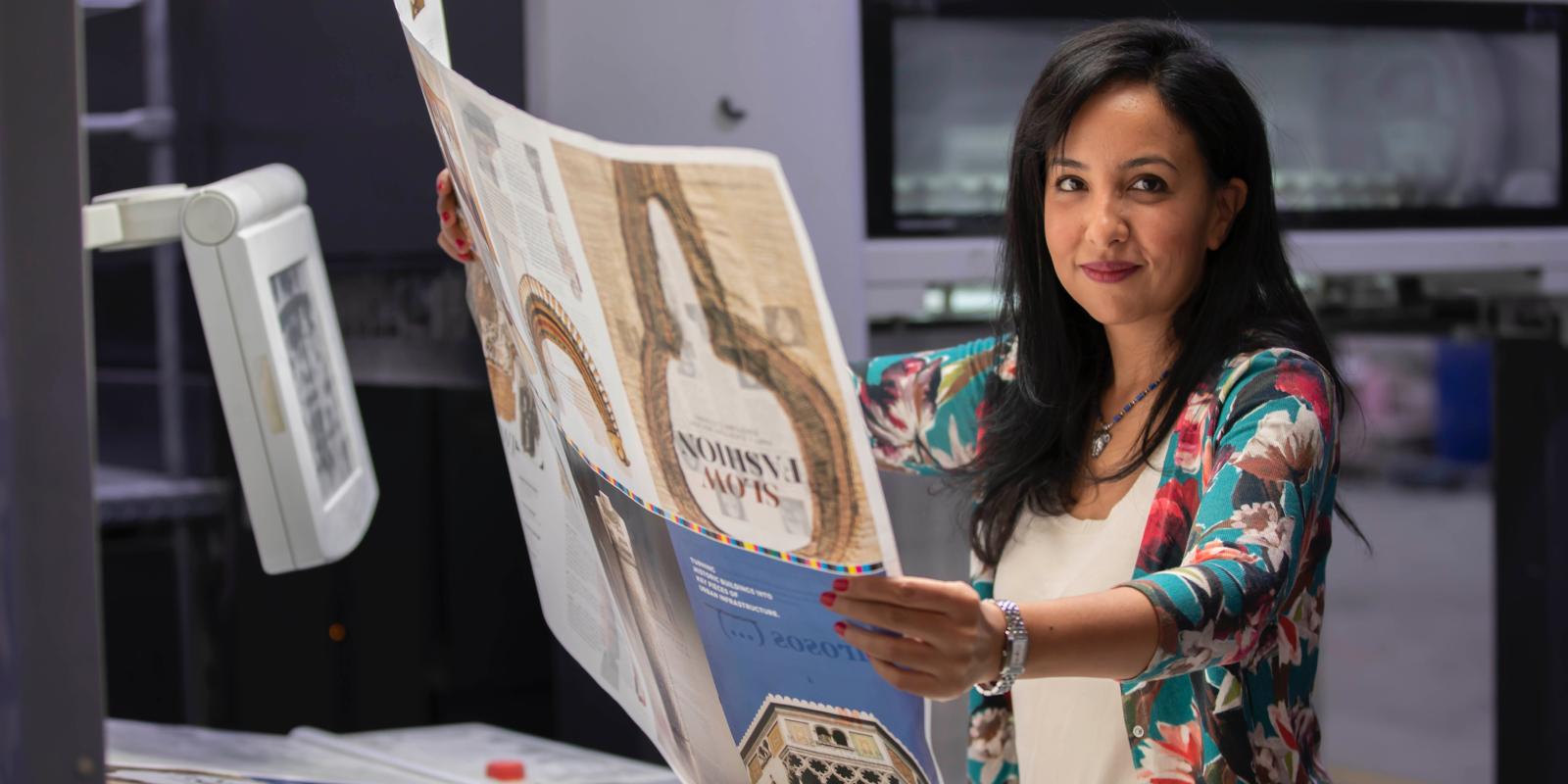
An Artistic Take on Egyptian History: Meet Alumna Yasmine El Dorghamy
Yasmine El Dorghamy ’00 was something of an unofficial Egyptian diplomat before she even graduated from college.
The daughter of an actual diplomat, El Dorghamy lived in five different countries before coming to AUC to complete her undergraduate degree. In every place she touched down — Japan, Greece, Turkey, Mexico — people wanted her to tell them about Egypt.
“And of course, when you’re Egyptian and abroad, you’re asked questions [specifically] about history,” she said.
Luckily, El Dorghamy had a passion for history, making a point to visit museums and archeological sites and talk to local historians wherever she went. That interest laid the foundation for her multifaceted career in education, history, art and culture.
After beginning college in Mexico, El Dorghamy returned to Egypt to finish her business degree at AUC.
“AUC was instrumental in reintegrating me into Egypt when I moved back,” she said. “I made friends, met like-minded people and began forming the network that would help me pursue my projects years later.”
She went on to get a master’s in international education policy from Stockholm University’s Institute of International Education. After working in development for several years, she eventually became executive director of the Qalaa Holdings Scholarship Foundation, a philanthropic fund that provides Egyptians with opportunities to pursue postgraduate study. In 2010, she founded Rawi — Egypt’s Heritage Review, an annual, bilingual publication focused on Egyptian history and cultural heritage.
El Dorghamy has found ways to support young artists and aspiring historians. She serves on the selection committee this year for the Art D’Egytpe Mahy Khalifa Art Fund, which provides talented young artists with educational support. She’s also an adjunct professor of visual culture at AUC.
“I was thrilled at the opportunity to share the knowledge I’ve acquired in a different way, with a younger age group than I’m used to,” she said of teaching at AUC. “It’s been very refreshing and enlightening for me.”
AUCians benefit from her extensive knowledge of Egyptian arts and culture. Rawi’s material spans 7,000 years of Egyptian history and brings together research from a vast array of specialists.
The 2016 edition of Rawi, which was a massive undertaking, is considered among the first and best encyclopedic references on Egyptian Modern Art.
“We took double the time to produce it, and it came out double the size. It turned out there was a huge need for it,” said El Dorghamy.
Rawi’s subject matter is intensive and far-reaching enough to be taught by professors in other universities, including internationally. Alex Dika Seggerman, an assistant professor of art history at Rutgers University-Newark, brought back 20 copies of the cinema edition for a seminar on Middle East cinema last year.
“Rawi was, and is, a wonderful teaching tool, especially for this area of scholarship on Egyptian cinema that — until some new 2021 and 2022 publications by AUC Press — was not very robust,” Seggerman said. “Rawi's readable and general perspective, as well as the fantastic design, is easy for students to engage with.”
General readability was exactly El Dorghamy’s goal. She initially founded the magazine — in its earlier iteration called Turath — because she wanted heritage researchers to find an audience beyond that of their insular academic journals.
The review has weathered several major storms, namely the 2011 Egyptian Revolution and COVID-19. During the revolution, El Dorghamy said she managed to keep the magazine relevant by “covering all the heritage-related issues at the time when a lot of archeological sites were being attacked and museums ransacked.”
“Just surviving is an achievement,” she said, laughing.
The publication celebrated its 10th anniversary last year and will soon launch a partnership with Google Arts & Culture in an effort to expand on more platforms. The most recent issue covered the history of costume and clothing in Egypt, and the next will focus on healing and the medical sciences.
El Dorghamy is modest about her business sense — she jokingly said it’s the most “boring” part of the work she does — but she has clearly figured out the key to juggling multiple successes and creating long-lasting organizations.
“It’s a cliche, but do what you love,” she said. “Do what you love, and you’ll be good at it.”
